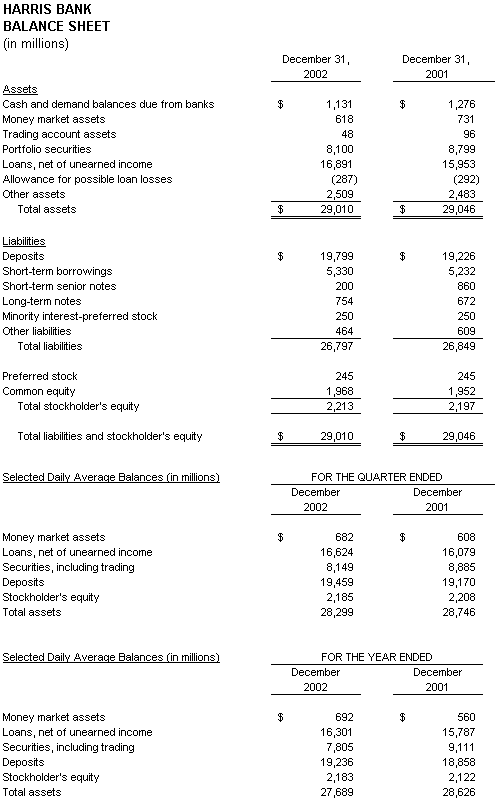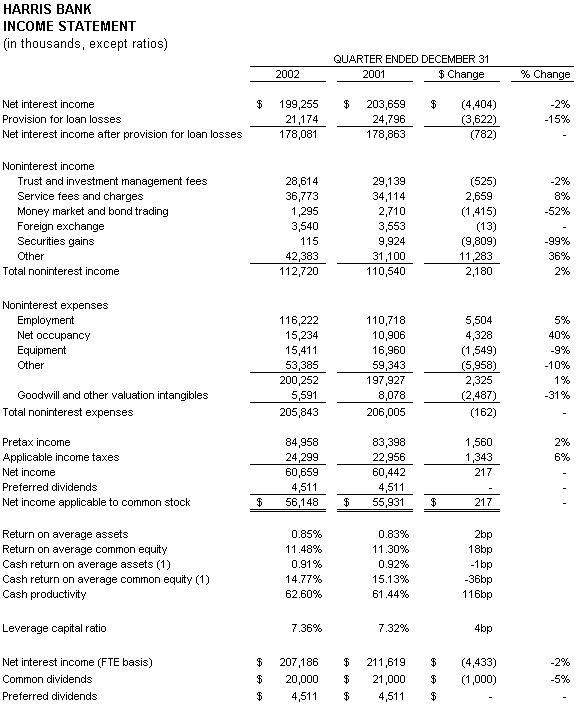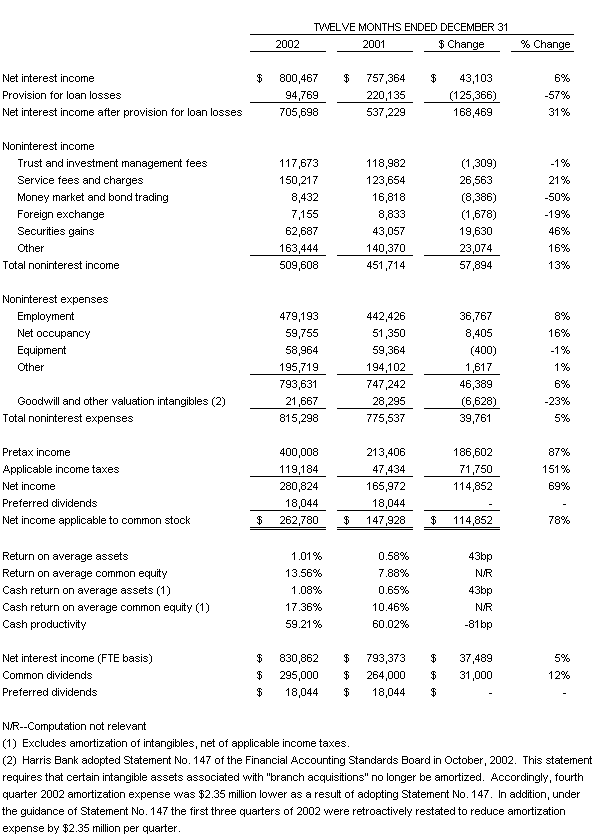News Releases
|
Harris Bank today announced net income of $60.7 million for the fourth quarter of 2002 and $280.8 million for full year 2002. Earnings were $60.4 million in last year’s fourth quarter and $166.0 million for full year 2001, including a special third quarter provision for loan losses and a special fourth quarter charge for impairment of certain equity securities. Excluding the impact of the $125 million special provision for loan losses and the $9.0 million impairment charge, annual earnings grew 12% in 2002 compared to 2001. Adjusting for unrealized gains on the securities portfolio which are recorded directly to equity, cash ROE was 15.60% for the current quarter and 17.97% for 2002. Frank J. Techar, President and Chief Executive Officer, attributed the favorable annual results to continued strong business growth in consumer, mortgage and small business loans and retail deposits, a reduction in the provision for loan losses and increased earnings from treasury activities. Fourth quarter net interest income on a fully taxable equivalent basis was $207.2 million, down $4.4 million or 2% from $211.6 million in fourth quarter 2001. Average earning assets of $25.4 billion in the current quarter were essentially unchanged from the prior year’s fourth quarter. Total loans increased by 3%, although consumer, mortgage and small business loans grew by $1.6 billion or 16%. Growth in these loans was offset by a decrease in corporate loans and investment securities. Net interest margin declined from 3.31% to 3.25%, primarily reflecting the impact of declining yields on the investment portfolio and lower levels of noninterest-bearing funds. Non-interest income was $112.7 million in the current quarter compared to $110.5 million in fourth quarter 2001, a 2% increase. Results for the prior year’s quarter included a $9.0 million special write-off for impaired equity securities. That quarter also included $9.9 million in net gains on the sale of investment securities compared to a nominal gain in the current quarter. Fourth quarter 2002 non-interest expenses of $205.8 million were down slightly from $206.0 million in the fourth quarter a year ago. Income taxes rose $1.3 million during the current quarter, reflecting higher pretax income compared to last year’s fourth quarter. The fourth quarter 2002 provision for loan losses of $21.2 million was down from $24.8 million in the fourth quarter of 2001. Net loan charge-offs during the current quarter were $19.4 million compared to $28.5 million in the same period last year, primarily reflecting lower write-offs in the corporate loan portfolio. Nonperforming assets at December 31, 2002 totaled $189 million or 1.1% of total loans, compared to $191 million or 1.2% at September 30, 2002, and $216 million or 1.4% a year ago. At December 31, 2002, the allowance for possible loan losses was $287 million, equal to 1.7% of loans outstanding, compared to $292 million or 1.8% at December 31, 2001. The ratio of the allowance for possible loan losses to nonperforming assets was 152% at December 31, 2002 compared to 135% at December 31, 2001. At December 31, 2002, regulatory Tier 1 capital of Harris Bank amounted to $2.04 billion, down from $2.07 billion at December 31, 2001. The regulatory leverage capital ratio was 7.36% for fourth quarter 2002 compared to 7.32% in the same quarter one year earlier. Harris Bank’s capital ratio exceeds the prescribed regulatory minimum for bank holding companies. For the year 2002, net interest income on a fully taxable equivalent basis increased 5% or $37.5 million, primarily resulting from an increase in net interest margin to 3.36% from 3.12% for the year ended December 31, 2001. This increase reflects the overall impact of a declining interest rate environment during the past year and a higher mix of retail funding. Average earning assets declined 3% from $25.4 billion to $24.7 billion in 2002, primarily attributable to a decrease of $1.3 billion in average investment securities. Average loans increased $514 million or 3%. Consumer, mortgage and small business credits grew 17%, while corporate loans declined. Non-interest income was $509.6 million for 2002. Excluding the special $9.0 million writedown of equity securities in 2001, noninterest income increased 11% from 2001. Net gains from sales of investment securities were up $19.6 million while service charge fees rose $26.6 million. Total revenue for 2002, excluding the impact of the acquisition of First National Bank of Joliet in third quarter 2001, rose 5% from 2001. Non-interest expenses rose 5% or $39.8 million in 2002. Excluding the impact of the Joliet acquisition, a one-time cost associated with the disposition of the Bank’s New York trust subsidiary following sale of the corporate trust business in 2000, and the impact of goodwill no longer amortized after 2001, expense growth was 4%. Income taxes increased $71.8 million reflecting substantially higher pretax income in 2002. The provision for loan losses was $94.8 million in 2002 compared to $220.1 million in 2001. Third quarter 2001 results included a $125 million special provision for loan losses. Net charge-offs were $99.8 million in 2002 compared to $104.5 million in 2001, primarily reflecting higher recoveries in the corporate loan portfolio for loans previously written off. This press release announcing Harris Bank’s earnings will be its last. In 2003, Harris Bank’s parent company, BMO Financial Group (BMO) plans to expand disclosure of results of its U.S. operations. This new disclosure will be more aligned with BMO’s segmented reporting which is in line with SEC requirements. This enhancement will provide more detail in respect of the client groups’ Canadian and U.S. operations and will facilitate the understanding of BMO’s U.S. operations, which extend beyond the Harris Bank legal entity. Harris Bank, registered as Harris Bankcorp, Inc., has voluntarily withdrawn as a registrant of the Securities and Exchange Commission (SEC). The company has no publicly-held securities outstanding that require SEC registration. Harris Bankcorp will continue to operate as a multibank holding company and remain subject to regulation by the Board of Governors of the Federal Reserve Bank. -30- Contact:
|



